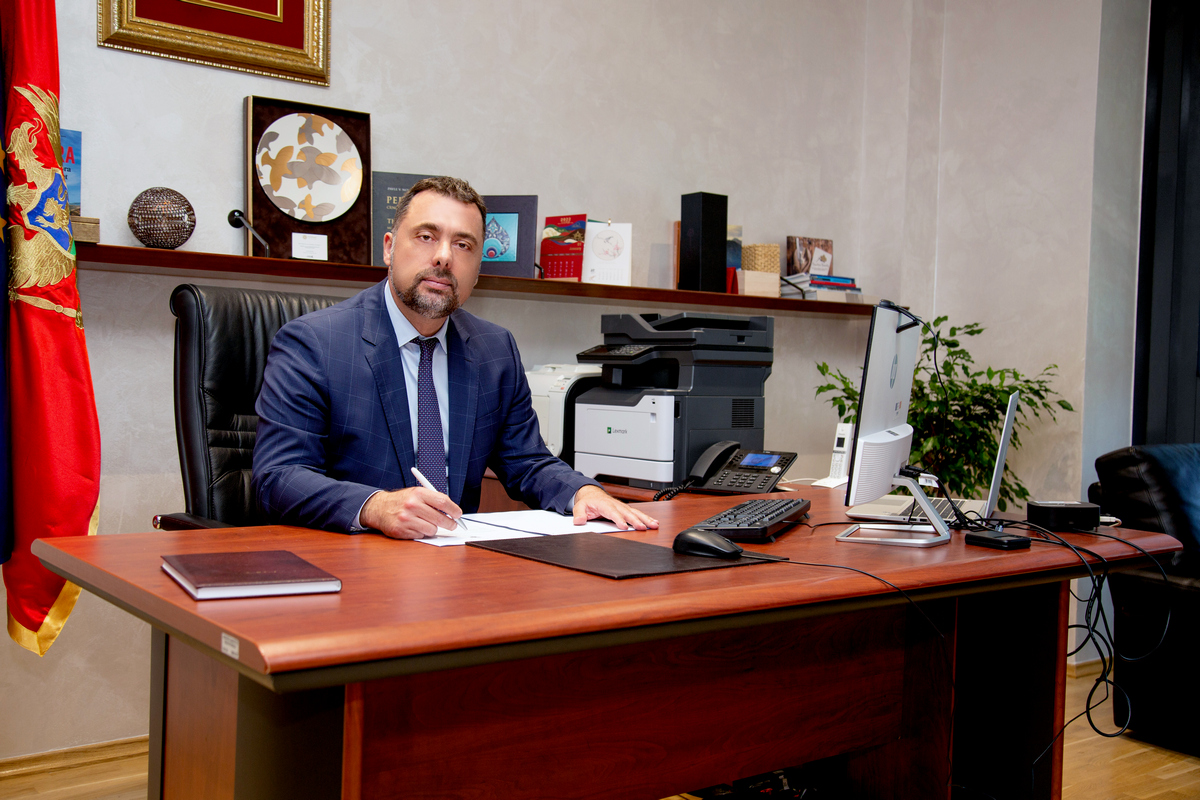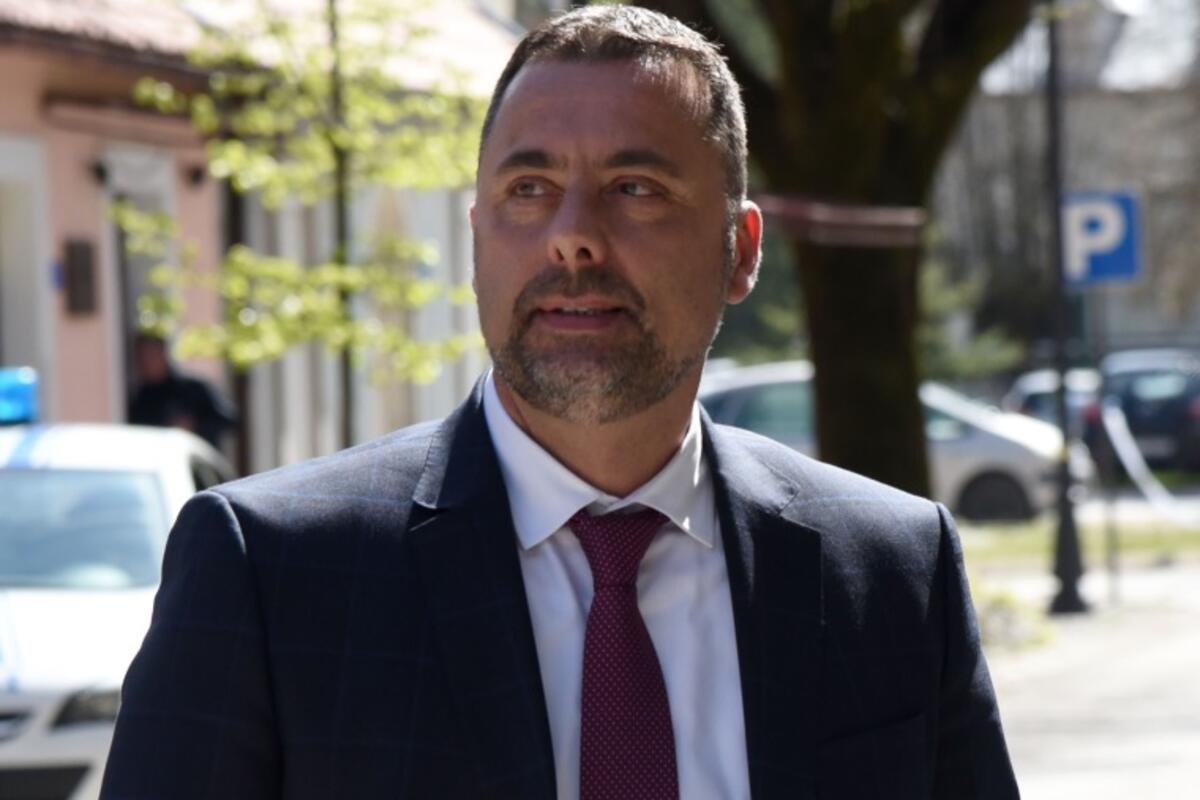Digitization is important for our economy, healthcare, education and for all citizens of Montenegro, and in the coming period we must do more to raise digitization to an even higher level
For our edition InFocus, we spoke with Goran Djurović, Montenegro’s Minister of Economic Development and Tourism, about the digitalization of Montenegro, the Open Balkans initiative, EU accession chapters and tourism and economic cooperation with Serbia.

The summit of the Open Balkan initiative was recently held. How do you feel about the idea of Montenegro joining the initiative, as an EU membership candidate?
Our biggest foreign policy goal is EU membership and any alternative or obstacle on this path is not and will not be our choice. Montenegro needs an open road to Europe, a smooth process of integration, the rule of law, suppression of the shadow economy and corruption, a better standard of living and a society in which people trust in the institutions of the system and feel safe.
I would like to underline that the Montenegrin government is only interested in protecting and taking care of the country’s national interests and the best interest of its citizens. If it turns out that our interests are respected and reflected in a more stable region and the Open Balkans initiative, we will support and join it. Furthermore, the Montenegrin government will form a Working Group that will consist of representatives of several ministries and whose task will be to analyze in detail and assess the extent to which the Open Balkans initiative is in line with the goals related to the country’s membership in the European Union.
We are determined to expedite the European integration process and be granted EU member status. We do not expect to have a privileged position, but objective recognition of the effort we have been investing in this process
As long as this initiative remains in its original form, i.e. as an economic project that focuses on people from the region, citizens and business, and does not become a political project, there is a chance that strong understanding and solidarity can prevail in our relations, which was not exactly a characteristic of the Western Balkans in the previous period. This will be the greatest victory for the idea of the Open Balkans, and I believe that this initiative represents a serious opportunity for the region to change its reality and overcome the challenges it faces. Additionally, it can be an opportunity to expedite the EU accession process because it facilitates economic cooperation between the regional countries.
The economic and monetary policy chapter was opened in 2018, and the monitoring mission assessed that more effort needs to be invested for this chapter to be closed. How far have you come with that and does the current Montenegrin government intend to close the said chapter during its term?
In terms of the EU accession process, which began in 2012, Montenegro has advanced the furthest of all the Western Balkan countries. We have so far opened 33 chapters and temporarily closed three.
Chapter 17 – Economic and Monetary Policy – was officially opened in 2018 and negotiations on this chapter are ongoing. To fulfill the requirements under this chapter, we need to improve the country’s macroeconomic stability, the stability of public finances and boost the competitiveness of its economy.
I would like to remind you that, in this chapter, Montenegro had two initial benchmarks, which were both implemented.
Furthermore, a lot of effort is being invested in meeting European standards, harmonizing the legal framework, fulfilling the criteria of a functional market economy and creating the conditions for closing this chapter. We are determined to expedite the European integration process and be granted EU member status. In this sense, we do not expect to have a privileged position, but objective recognition of the effort we have been investing in this process.
We are determined to compensate for a long period of stagnation and setbacks in certain areas in the process of negotiations between Montenegro and the EU with real results and the serious commitment of the 43rd Montenegrin government for Montenegro to become the next EU member.

Montenegro’s vision is to become the country with the fastest digital development in the region. What steps will you take to achieve that?
Digital development in Montenegro is recognized as an opportunity for the long-term success and prosperity of the entire society. Digitization is important for our economy, healthcare, education and all citizens of Montenegro, and in the coming period, we must do more to increase digitization to an even higher level. By doing so, we are going to reduce the bureaucracy and simply administrative matters for our citizens.
The basis of Montenegro’s digitalization and rapid development lies in the fact that we are one step ahead of the regional countries in the implementation of the 5G network, which will positively affect the lives of our citizens, as well as the quality of services.
Trial 5G networks have already been installed, and a frequency auction for the 5G network will be launched in the second half of the year. Once that is done, we will make a big step forward and be perhaps the leading Western Balkan country in the implementation of the 5G network. Our operators are very agile and show great interest in the 5G network being put into operation as soon as possible. I expect that this process will be completed very quickly.
I am also confident that Montenegro’s future rests on digitization and that digitized processes and services will benefit both citizens and the economy. We also want these services to be aligned with global standards and this is something that both the government and all system institutions will take part in.
You said that the relations between Montenegro and Serbia should be further elevated. Where are the opportunities for improving cooperation in the economy and tourism?
First of all, I would like to underline that Serbia is an important strategic and economic partner for Montenegro and that it is completely natural for us to have much better cooperation, not only in the economy and tourism but in all segments, such as transport connectivity, road and railway network, investments, IT sector, renewable energy, etc. I appreciate that the relations between Montenegro and Serbia are as close and friendly as possible, as they should be in the future, and that they are nurtured in the spirit of cooperation and partnership, which would ultimately result in numerous benefits for the economy and citizens alike. I also said this during my first working visit to the Republic of Serbia.
Therefore, our two countries have a lot of potential for improving overall cooperation. Still, the economy is a fundamental issue and at this moment, the most important thing is to base the relationship on economic cooperation. In the context of the market and the flow of goods, improving infrastructure is certainly something that contributes to the development of our two countries, along with all the things that we do internally in order to create the best possible market environment. Continuing to boost the trade between the two countries, with the stability of supply as well as greater participation of Montenegrin products in the Serbian market, are our priorities in the coming period.
I appreciate that the relations between Montenegro and Serbia are as close and friendly as possible, as they should be in the future, and that they are nurtured in the spirit of cooperation and partnership
In terms of tourism, Serbia remains one of the most important markets for Montenegro. A large number of tourists from Montenegro visit Serbia, especially during winter, while a substantial number of tourists from Serbia visit Montenegro during the summer season. I hope they return home with good impressions. Our goal is to extend the tourist season and welcome the guests from Serbia with new offers and tourist attractions throughout the year.
The Health Tourism Development Programme has been presented too. When is it going to be implemented?
Health tourism is recognized as one of the types of tourism that can contribute to the diversification of Montenegro’s overall tourist offer and turn the country into a year-round tourist destination.
The importance and need for health tourism have especially come to the fore in the post-Covid period, primarily in terms of its contribution to general health, i.e. from the aspect of disease prevention, health preservation and restoration of a healthy lifestyle.
Health tourism is recognized as one of the types of tourism that can contribute to the diversification of Montenegro’s overall tourist offer
Montenegro has great potential for development in health tourism. Furthermore, we are widely recognized for our Dr Simo Milošević Institute, especially in Scandinavia. Apart from a prevention and rehabilitation programme, the Institute has wellness and recreational facilities. This is precisely our goal, i.e. to have a more diverse offer of these types of accommodation, including hotel capacities, in Montenegro.
Since health tourism is not seasonal in nature, it gives us an excellent opportunity to increase our pre- and post-season tourist stays, and therefore the turnover that that generates.
A new working group for the promotion of tourism in Serbia and Montenegro has been formed. What kind of tourist season do you expect when it comes to visits by Serbian tourists?
The interdepartmental working group for the promotion of tourism aims to step up the ongoing campaign and strengthen the ties between the two countries in this area.
Through regional cooperation and joint action and offer, the goal is to attract tourists, especially from new markets, such as those from Asia, Canada, America, etc., who find a joint regional offer more appealing than an individual one.
We must not forget that the Serbian market is crucial for Montenegro in terms of the number of tourists. According to the data collated by the Montenegrin Statistical Office (MONSTAT), t total of 430,000 tourists from Serbia visited Montenegro last year. Given that the situation with Covid-19 is much better this year, and that there are more flights between the two countries, I expect that we will accomplish better results this year relative to the last one.